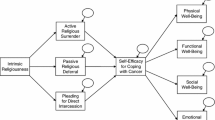Abstract
The relationship between transcendent meaning attribution, religious orientation, and psychological well-being was studied in cancer and noncancer patients to test the hypotheses that intrinsic religious values and life meaning enhance coping and well-being during the course of the life-threatening illness. Subjects were 44 patients receiving medical treatment for cancer and noncancer medical conditions. In the cancer group, higher levels of attributed life meaning were positively linked with intrinsic religious orientation, and associated with lower levels of despiar, anger-hostility, and social isolation. Cancer patients scored higher than noncancer patients on depersonalization, suggesting the presence of psychic numbing in response to their illness. Noncancer group results were characterized by positive correlations between the two groups in coping styles and salience of life meaning attribution. A rationale for the observed differences in coping styles between the two groups is presented, highlighting perceived life threat as a key differentiating variable.
Similar content being viewed by others
References
Choron, J.C.,Death and Western Thought. New York, Collier Press, 1963; Grof, S., and Halifax, J.,The Human Encounter with Death. New York, E. P. Dutton, 1978.
Ring, K.,Life at Death: A Scientific Investigation of the Near-Death Experience. New York, Coward, McCann, & Geoghen, 1980.
Frankl, V.,The Unconscious God. New York, Simon & Schuster, 1978.
Kotchen, T., “Existential Mental Health: An Empirical Approach”,Individual Psychology, 1960,16, 174–181.
Noyes, R., “The Experience of Dying”,Psychiatry, 1972,35, 174–184.
Lifton, R. J.,The Broken Connection: On Death and the Continuity of Life. New York, Simon & Schuster, 1979.
Allport, G., and Ross, J. M., “Personal Religious Orientation and Prejudice”,Personality and Social Psychology, 1967,5, 4, 432–443.
Allport, G., “Behavioral Science, Religion, and Mental Health”,J. Religion and Health. 1963,2, 3, 187–197.
Hunt, R. A., and King, M., “The Intrinsic-Extrinsic Concept: A Review and Evaluation,”J. Scientific Study of Religion, 1971,10, 4, 339–356; Spilka, B., and Minton, B., “Defining Personal Religion: Psychometric, Cognitive, and Instrumental Dimensions”. Paper delivered at the convention of the Society for the Scientific Study of Religion, Milwaukee, Wisconsin, October, 1975; Batson, C.D., “Religion as Prosocial: Agent or Doubleagent,”J. Scientific Study of Religion, 1976,15, 29–45.
Sanders, C.; Mauger, P. A.; and Strong, P.,A Manual for the Grief Experience Inventory. Tampa, Center for Applied Gerontology, 1979.
Ibid..
Lifton,op. cit., p. 17. Also Lifton,the Life of the Self. New York, Simon and Schuster, 1976. pp. 79–80.
Alexander, I. E., and Alderstein, A. M., “Death and Religion.” In Feifel, H., ed.,The Meaning of Death. New York, McGraw-Hill, 1959.
Weisman, A. D.,On Dying and Denying: A Psychiatric Study of Terminality. New York, Behavioral Publications, 1972.
Allport and Ross,op. cit. “, p. 438–442.
Mauger, P.: Simpson, D.; and Adkinson, D., “The Assertiveness and Aggressiveness of Affirming Christians Versus Nonreligious Persons.” Unpublished manuscript. Georgia State University, 1979.
Weisman, A. D.,Coping with Cancer. New York. McGraw-Hill, 1979.
—, “Psychosocial Considerations in Terminal Care.” In Schoenburg, R.; Carr, A. C.; Peretz, D.; and Kutscher, A. D., eds.,Psychosocial Aspects of Terminal Care. New York, Columbia University Press, 1972.
Hackett, T., and Weisman, A. D., “Reactions to the Imminence of Death.” In Grosser, G. H.: Wechsler, H.; and Greenblatt, M., eds.,The Threat of Impending Disaster, Cambridge, Mass., MIT Press, 1964, 300–311.
Cohen, F., and Lazarus, R. S., “Active Coping Processes, Coping Dispositions and Recovery from Surgery,”Psychosomatic Medicine, 1973,35, 375–389; Cohen, F., and Lazarus, R.S., “Coping with the Stresses of Illness.” In Stone, G., ed.,Health Psychology. San Francisco, Jossey-Bass, 1980; Lazarus, R. S., “Positive Denial: The Case for Not Facing Reality.”Psychology Today, November, 1979, 44–60.
Allport, G.,The Individual and his Religion. New York, MacMillan Company, 1950, p. 142.
Author information
Authors and Affiliations
Additional information
The work reported here was presented in partial fulfillment of the requirements for the Master of Arts degree in Psychology, Department of Psychology, Georgia State University, by the first author under the direction of the second and third authors. An abridged version of this paper was presented at the annual meeting of the American Psychological Association. Washington, D. C., August 25, 1982. Special thanks to Roger Bakeman, Ph.D., for his helpful suggestions.
Rights and permissions
About this article
Cite this article
Acklin, M.W., Brown, E.C. & Mauger, P.A. The role of religious values in coping with cancer. J Relig Health 22, 322–333 (1983). https://doi.org/10.1007/BF02279928
Issue Date:
DOI: https://doi.org/10.1007/BF02279928




